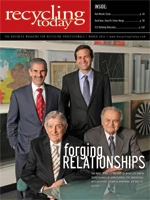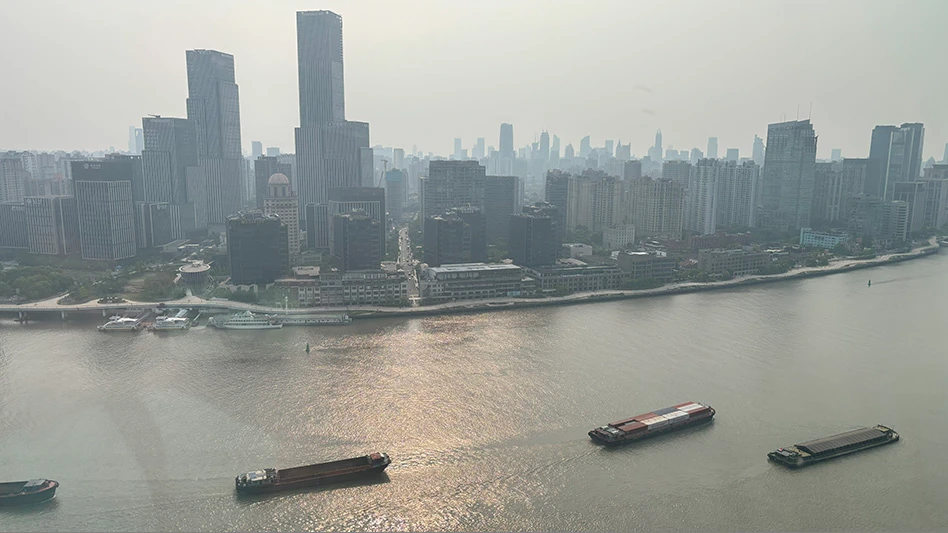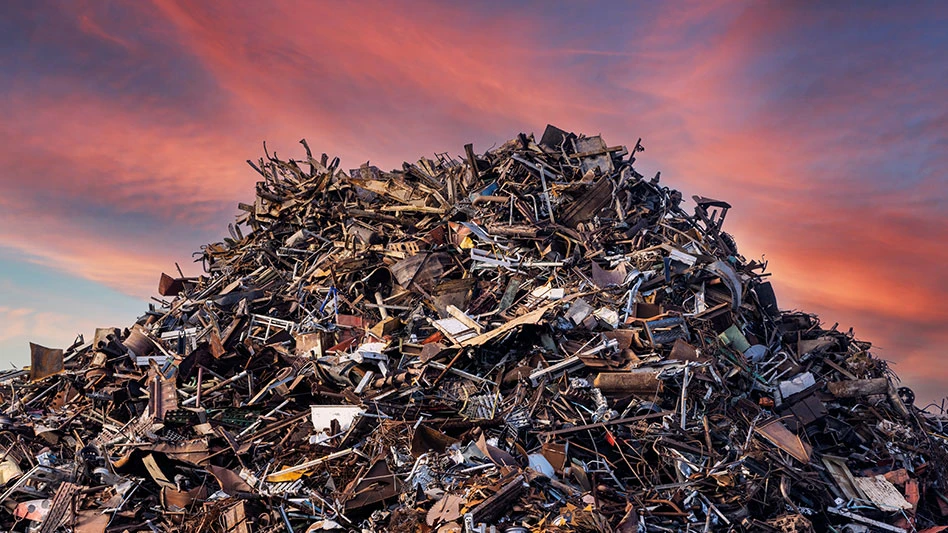 Scrap processing and trading technology has changed dramatically over the course of 80 years, but the officers who lead The Alpert Group LLC, located in Los Angeles, can also point to several important constants.
Scrap processing and trading technology has changed dramatically over the course of 80 years, but the officers who lead The Alpert Group LLC, located in Los Angeles, can also point to several important constants.
Three generations of the Alpert and Farber families have helped guide their businesses through many changes, while constantly adhering to the core principles established by the founders. Herman and Mandel Alpert, brothers who immigrated to the United States in 1906, co-founded the scrap collection and peddler business that would eventually become Alpert & Alpert Iron & Metal Inc.
The brothers arrived in America at Ellis Island, and worked their way across the country collecting and selling scrap metal, rags and other recyclables before eventually settling in Los Angeles. In the 1930s, after gaining more than 20 years of scrap metal experience, the brothers, along with Herman’s sister-in-law Frances Brody, formed the Alpert & Alpert Junk Co. The trio presided over a company that grew steadily throughout the 1930s, 1940s and 1950s, moving into increasingly larger parcels of land.
In 1950, Herman’s son Raymond Alpert and son in law Jake Farber, both joined the company full time, thereby beginning two of the most noteworthy careers in the history of the scrap metal industry. The duo (who will be honored at the 2011 ISRI Annual Convention with lifetime achievement recognition) would combine to provide leadership to the company as its volumes continued to grow. After Herman passed away in 1957, Frances Brody served as president of the company, becoming one of the pioneering women in the scrap recycling industry. Frances, along with Raymond and Jake, would guide the next generation of the family business.
TURNING POINT
Starting in the early 1950s, Alpert & Alpert, working through New York-based brokerage houses, began sending shipments of metal to consumers in Asia. At one point they were advised that a consumer had filed a claim from a recent red metal scrap shipment. When Jake asked a personal friend, who happened to be in Asia at the time, to visit the consumer, he discovered that there was actually no claim or even a complaint. What the buyer said was, “This is good material, I wish we had more of it,” recalls Jake. This particular incident led Jake and Raymond to work directly with Asian scrap buyers, and became a pivotal point in their history as they forged direct relationships with overseas metal consumers.
In 1969, Jake made his first of many trips to Asia, starting an initiative to build direct bridges to that part of the world. The initiative led to the hiring of agents in several countries, and these long-term business relationships, which have spanned decades, eventually turned into lasting friendships.
Alpert & Alpert’s direct link to Asia put it ahead of many other scrap companies, providing a critical competitive advantage that Jake and Raymond would be able to pass on to their sons, the next generation of company leaders. Alpert & Alpert now has liaison offices in Japan and China, an exclusive representative in France, as well as agents in South Korea, Taiwan and India. On a daily basis they trade metal throughout North America, the Middle East, Central America and South America to consumers both domestically as well as in Asia and India.
STRATEGIC CHOICES
After Frances retired, Jake became president of the company. Along with Raymond, they continued to test out new ventures and made decisions as to where to focus the company’s resources.
They decided to build an aluminum smelting company named Vista Metals Corp. “Vista was organized in 1968,” says Jake. “It was started by two people who operated a small furnace mounted on a truck. They would buy scrap at air bases and melt this scrap on site.”
The endeavor proved successful, resulting in further investments and the establishment of a facility in Fontana, Calif., that has over the years produced aluminum ingot, billet and slab. In 2010, the family completed construction of its new aluminum facility, Vista Metals Georgia, just north of Atlanta. Today Vista Metals Corp. and Vista Metals Georgia are two of the world’s largest producers of specialty alloys, servicing the aerospace, aircraft and automobile industries.
 FROM GENERATION TO GENERATION
FROM GENERATION TO GENERATION
With so much already happening, Jake and Raymond were ready for help from their sons. Both Howard Farber and Alan Alpert had spent summers learning the operations and yard processing aspects of the business, and each was certain that they wanted to play a role in the family business.
In 1979, Jake’s son Howard began working for Alpert & Alpert full time, and in 1980 Raymond’s son Alan came aboard. Howard and Alan accepted a growing number of responsibilities within the family business and together they followed pathways to company leadership. Howard now serves as President of The Alpert Group LLC, and Alan as President of Alpert & Alpert Iron & Metal Inc.
Their fathers are still coming to the office four days per week, and continue to provide wisdom and guidance to their sons as well as to others in the company. As one trader at Alpert & Alpert phrased it, “With those two gentlemen at our disposal daily, it’s like having the ability to take a graduate class from two master professors. Their knowledge of the industry is beyond reproach and Alan & Howard mirror them in so many ways.”
While the current generation of leadership has taken the reins concerning all aspects of the business, like their fathers before them, they also consult with each other regularly to make strategic decisions. “For the most part, in the day-to-day scrap business, Alan makes the decisions,” says Howard. “Although if it’s a large strategic decision, then we’ll talk about it,” he adds.
As president of The Alpert Group, Howard communicates regularly not only with Alan, but also with the corporate officers running Vista Metals, Vista Metals Georgia and other companies to which they have an interest. (See the “At a Glance” sidebar.)
The current set of decisions that Howard and Alan face, range from strategic planning, coping with volatile and unpredictable metals prices and markets, ensuring solid relationships with lenders in a turbulent banking climate, managing the real estate holdings of the shareholders and establishing the guidelines for the next generation of leaders.
 RULES OF GOOD CONDUCT
RULES OF GOOD CONDUCT
Growing a company from three employees to currently about 400, Raymond, Jake, Howard and Alan each point to many decisions and strokes of good fortune that have been major factors in that growth. Beyond specific decisions though, all four men point to core values and philosophies, or ways of doing business, which are a central part of the company’s story.
“Treating people the way you want to be treated yourself—that is something we always bear in mind,” says Raymond. Jake says this philosophy manifests itself in conducting business so that “People have confidence that if they trade with us, they know we’ll do the right thing.”
These values were severely tested in the fall of 2008, but Alan and Howard say that keeping commitments through the market turmoil has ultimately paid off. “From our side, although some of our orders were cancelled, we paid our suppliers for what we had committed to them, even after the markets collapsed,” says Howard. “This business is about relationships,” Howard emphasizes, noting that this truism was reinforced at a time when the markets were in chaos.
While that period created some short-term financial pain, Alan says in the ensuing two-and-a-half years, it has resulted in loyalty from those suppliers (from smaller scrap dealers to even large multi yard entities) and the introduction of many new suppliers who were not treated as well by the companies they were trading with during the fall of 2008.
Long-term loyalty also exists within each of their family owned businesses. “We like to think it results from treating all of our employees with respect and compensating them fairly. We take great pride in our relationships with all of our employees and the fact that we help provide a good standard of living for over 400 families,” says Howard.
Alan adds that “The way we treat our employees transcends into the way that we treat our customers. It is all about relationships, which have led to not only years of mutually beneficial business dealings, but in many cases, lifelong friendships.” This approach has yielded operations and office employees who have worked 20, 30 and even 40 years for the company, many of whom have recruited second and third generation family members of their own to work for Alpert & Alpert.
The Alperts and Farbers have also established a tradition of donating time and talent to trade associations. (See the sidebar “Close Associations”.)
THE CURRENT SCOPE
As of the spring of 2011, Howard and Alan are involved with a number of ongoing operations to manage, and several new opportunities to consider.
The management of existing and growing parts of their family business, along with new ventures, provides Howard and Alan with no shortage of management tasks. “It gives us plenty to do,” says Howard, “and we don’t try to do it alone. That’s why we put a tremendous effort into hiring the best people we can find and have even brought in outside consultants when we felt it appropriate. We don’t pretend to know it all, and there are a lot of talented people out there who can help.”
 It’s trading and processing operations remain focused on aluminum, copper, stainless steel and high-temp alloys. A visitor to either Alpert & Alpert’s 7.5 acre Los Angeles facility or its 7 acre Long Beach, Calif., plant will see considerable truck and forklift traffic, as well as active work zones within the plants. On the stainless steel and alloys side, their team has developed a proprietary method to add value to machine shop turnings. This development has led to Alpert & Alpert becoming a volume leader in this industry sector.
It’s trading and processing operations remain focused on aluminum, copper, stainless steel and high-temp alloys. A visitor to either Alpert & Alpert’s 7.5 acre Los Angeles facility or its 7 acre Long Beach, Calif., plant will see considerable truck and forklift traffic, as well as active work zones within the plants. On the stainless steel and alloys side, their team has developed a proprietary method to add value to machine shop turnings. This development has led to Alpert & Alpert becoming a volume leader in this industry sector.
The copper and brass department continues to expand as they process a considerable amount of scrap generated by utility companies. It benefits on the aluminum side by making furnace-ready packages for both primary and secondary smelters, as well as active involvement in worldwide trading of used beverage cans (UBC).
In 2003, the company was faced by a series of setbacks—the closure of both their former ferrous and nonferrous scrap processing facility and joint venture automobile shredding company in Carson, Calif.
While initially these events were looked upon as detrimental to the family business, ultimately they presented themselves with a unique opportunity. Once they relocated the scrap processing facility to Long Beach, they realized that they had almost 18 acres of prime land in the Los Angeles real estate market that eventually will be developed.
On a day-to-day basis, Howard and Alan rarely have any downtime, and they credit their employees with making operations flow smoothly. “Working together, with the best people possible is the way to get things accomplished,” says Alan. “Throughout the 80-plus years of our company’s history, it has allowed us to grow in so many different areas, and we are excited for the great position we have now created for ourselves to grow in the future.”
The author is editor-in-chief of Recycling Today and can be contacted at btaylor@gie.net.
Get curated news on YOUR industry.
Enter your email to receive our newsletters.

Explore the March 2011 Issue
Check out more from this issue and find your next story to read.
Latest from Recycling Today
- Republic Services, Blue Polymers open Indianapolis recycling complex
- Altilium produces EV battery cells using recycled materials
- Brightmark enters subsidiaries of Indiana recycling facility into Chapter 11
- Freepoint Eco-Systems receives $50M loan for plastics recycling facility
- PET thermoform recycling the focus of new NAPCOR white paper
- Steel Dynamics cites favorable conditions in Q1
- Hydro starts up construction in Spain
- Rebar association points to trade turmoil





